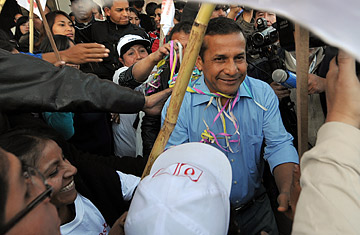
The presidential candidate of the nationalist Gana Peru party, retired army commander Ollanta Humala, is greeted by a crowd of sympathizers on June, 1, 2011, upon his arrival to Cuzco.
Much attention has been spent on the candidacy of Keiko Fujimori to be president of Peru. After all, she is the daughter of a controversial former president who now sits in prison. However, according to polls, she is running neck-and-neck with Ollanta Humala, a political figure who evokes as much controversy and, at times, hatred as the Fujimori family does.
Humala, 48, is a retired lieutenant colonel in the Peruvian Army. The military was his life for 20 years and up until 2005 he thought his service to the country would only be in the army. "I never really thought about the presidency," he insists during an interview with TIME two days before the election. "My dream was to be the commanding general of the army." However, he did enter politics, quitting his job as military attaché in Seoul, South Korea. Frightening the more privileged classes with a leftist rhetoric that conjured up images of Venezuela's Hugo Chávez, he nevertheless came very close to winning his first presidential run in 2006, receiving 47% of the vote. This time around, he got 32% in the first round of presidential voting in April, placing first by a margin of nearly eight points and moving into Sunday's runoff.
Fujimori, however, made up lost ground, took the lead in some polls for a while and is now in a dead heat with Humala. Two polls had in him first place, between one and three points ahead of the congresswoman, while two others had Fujimori up by one point. Giovanna Peñaflor, of the IMASEN polling firm, said the country has never been this politically polarized or divided. She said the election is anyone's game, because "support is fragile. A large number of voters are voting against a candidate instead of for one."
While Humala is defined as center-left and Fujimori as center-right, the two have very similar ideas when it comes to bread-and-butter issues. They both offer a long list of social programs, including free day care, scholarships for the best high school students and assistance to senior citizens. In terms of economic policy, both say they will pay for part of their platforms by levying a windfall tax on mining, the motor of Peru's fast-growing economy, and by attracting more foreign investment.
During the campaign, Humala hammered at his opponent over her father's regime — its legacy of corruption and human rights abuse — and the fact that many of his advisors are now her advisors. Humala has made great fun of the fact that the former president's private nurse at his specially built prison cell ran for Congress on his daughter's ticket. In their only official face off, a testy debate on May 29, Fujimori snapped at Humala, saying if he wanted to debate her father he should go to the police barracks where he is incarcerated.
Humala also has problems because of his links to a President — but this one isn't in Peru or even Peruvian. That would be Venezuela's Chávez. Learning from incumbent President Alan García's successful run-off against Humala in 2006, the Fujimori campaign has accused the ex-military man of being a puppet of Chávez. There certainly was a political affinity between Humala and Chávez in 2006, with the Venezuelan president taking shots at García during the race. This time around, however, Humala has chosen a new mentor, looking to Brazilian former president, Luiz Inácio Lula da Silva, and the example of Peru's hugely successful neighbor for an economic model.
The U.S. government appears to have taken sides, with a former U.S. assistant secretary of state for western hemisphere affairs Roger Noriega, repeating local allegations that Chávez has financed Humala's current campaign. "I categorically deny this. It is irresponsible for an ex-diplomat to be making these kinds of allegations three days before Peruvians vote," Humala told TIME. Noriega, like Peruvians who have made similar accusations, did not produce evidence.
Peruvians opposed to Humala see similarities to Chávez. Humala shot to fame in October 2000 when he led a small band of soldiers in a southern barracks in a revolt against his rival's father who was then the president and already reeling from a massive corruption scandal that would eventually end his rule. Chávez's political career began in much the same way in the 1990s. Humala, who was then jailed and dismissed from the army, said that action was simply aimed at getting rid of a corrupt president and nothing more. "The only thing I wanted after the uprising was to rejoin the army and continue with my career. I had no political intentions," he told TIME.
But there may be another precedent that Humala may repeat. If he does win on June 5, Humala will be in the footsteps of the only other Peruvian military officer who was democratically elected president. Luis Sánchez Cerro led a military coup in the 1930s and was a military attaché to France. He returned to Peru and was elected president. Humala was reinstated into the army in 2001 after his attempted coup and then named military attaché to France before he went on his brief interlude in South Korea. Instead of being a Chávez imitator, Humala could very well be replicating Sánchez Cerro.
